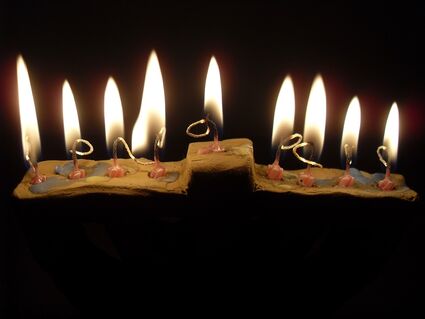When you don't have a menorah ...
December 18, 2020
(JNS) -So you don't have a menorah. And you don't have access to supplies that would enable you to create a reasonable facsimile of one. This was the position my mother, Rachel, was in when she was 15 years old.
A great miracle had occurred four months earlier - Rachel had been selected to leave Auschwitz for a slave labor camp. After two-and-a-half months in the shadows of the gas chambers and crematoria, she was sent to Christianstadt, a Frauenarbeitslager (women's work camp). Three weeks later, another miracle: An SS officer chose her to work in the kitchen - a privileged post of war.
Given her access to provisions, Rachel could contribute to a clandestine Chanukah celebration. On Dec. 1, the first night of the holiday in 1944, she pilfered potatoes from the kitchen. With their insides scooped out, they served as holders for oil, into which she inserted twisted threads. For each of eight nights, two women in her barracks took turns lighting these "wicks" with the shamash - a tall kitchen match sunk into a potato half. These women led the small, forlorn group of teenagers in quiet prayer and song. Standing in the glow of lit threads, Rachel hoped she would see her parents again. She prayed for another miracle: the war's end, a moment in which the Jews would prevail.
This was not entirely a pipe dream. After the battles in Normandy and the Netherlands, leaders of the Supreme Headquarters Allied Expeditionary Force felt confident they would soon breach the fortress of Germany, winning the war. But their offensive strategies gave way when 15 German divisions launched a surprise attack in the Ardennes region; America would ultimately commit more than 600,000 men to the Battle of the Bulge.
The answer to Rachel's Chanukah prayers would not come for five months. Five months that included a six-week death march through the Sudetenland. Townspeople gawked at the parade of a thousand ragged "witches" trekking through their streets. In the countryside, Wehrmacht guards ordered fearful farmers to provide for their captives some meager form of sustenance and nighttime accommodations in barns. Starved, parched and incensed at the shootings of innocents who could not keep up, Rachel endured. Her prayers morphed into magical thinking - if she recited a special mantra, she would be able to quiet a barking dog and make it to a farmhouse door to beg for food.
The worst of Rachel's ordeals was yet to come. In mid-March 1945, she and other of Christianstadt's survivors arrived in Bergen-Belsen - a hellish camp in northwest Germany - the largest depository for inmates who had already survived so much, having evaded the gas chambers, labored for the Nazi war machine and suffered grave depredations. And in this place devoid of habitable housing, sanitary facilities and food, they were dying by the thousands. On April 15, Rachel and others who were emaciated and deathly ill saw a miracle they had not the strength or will to celebrate. Finally, three weeks before the war's official end, units of the British Second Army had come to save them.
Chanukah 1944 was a bright interlude in the darkest of times. An improvised menorah. Prayers for a miracle. Remembering history while living it.
Bernice Lerner, author of "All the Horrors of War: A Jewish Girl, a British Doctor, and the Liberation of Bergen-Belsen" (Johns Hopkins University Press, 2020), is the former dean of adult learning at Hebrew College and a senior scholar at Boston University's Center for Character and Social Responsibility.







Reader Comments(0)